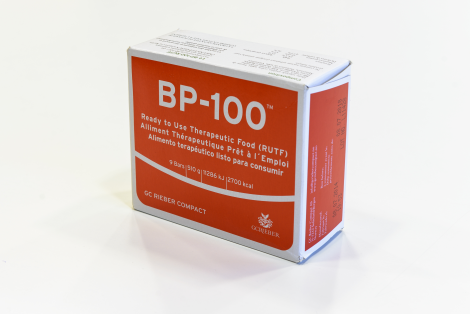S0000242
RUTF biscuit,packs,510g./CAR-24
Ready to Use Therapeutic Food (RUTF), Biscuit, pack of 9 bars, 510 grams. 24 packs per carton. BP-100, RUTF biscuit is to be used by humanitarian agencies, governmental and non-governmental organisations for the treatment of Severe Acute Malnutrition (SAM) in any cultural setting. RUTF biscuit may be used in a wide variation of climatic zones and may be the sole source of food, except for water and breast milk, during the period of use.
Indicative Price 67.20 USD
General Description:
BP- 100 is a Ready-to-Use Therapeutic Food (RUTF) biscuit, a high-energy fortified food equivalent to that of the WHO-F100 rehabilitation diet but with a higher energy density.
BP-100, RUTF biscuit is to be used by humanitarian agencies, governmental and non-governmental organisations for the treatment of Severe Acute Malnutrition (SAM) in any cultural setting. RUTF biscuit may be used in a wide variation of climatic zones and may be the sole source of food, except for water and breast milk, during the period of use.
Packed in cartons of 24 packs where each pack contains 9 bars.
Each bar is 2 biscuits of 28.4 g.
Suggested dosage:
-The average daily dosage of BP 100 equal to 2 sachets of RUTF (92g) is 7 x 28.3g tablets of BP 100.
-Each box of BP-100 contains 510g, enough for 2,6 days for a child using 7 tablets a day.
-1 carton (12.24 Kg net weight) of BP-100 provides treatment for an average SAM child for 63 days
Technical Specifications:
RUTF biscuits are compressed bars, manufactured from a mixture of cereal, milk powder, vegetable oil and carbohydrates, with added vitamins and minerals.
- Ready to use: be eaten directly (no cooking/mixing/dilution required) or crumbled into drinking water and eaten as porridge.
- Storage conditions: as defined by the manufacturer, no refrigeration required.
- Shelf life: 4 years
Nutritional composition
Moisture content: 4% maximum
Water activity: 0.6 maximum
Energy: 500 kcal/100 g minimum
Proteins: 10-12% total energy
12.3-15.5% by weight
Lipids: 45-60% total energy
24.8-33.0% by weight
n-6 fatty acids: 3-10% total energy
n-3 fatty acids: 0.3-2.5% total energy
Trans-fatty acids: <3% total fat
Carbohydrates (difference): 40-6-% (approx, by weight)
Fibres: 5% maximum
Ash: 5g /100g maximum
Minerals (per 100g)
Sodium: <290 mg
Potassium: 1100-1400 mg
Calcium: 300-600 mg
Phosphorous: 300-600 mg, Expressed in terms of non-phytate phosphorus
Magnesium: 80-140 mg
Iron: 10-14 mg
Zinc: 11-14 mg
Copper: 1.4-1.8 mg
Selenium: 20-40 mcg
Iodine: 70-140 mcg
Vitamins (per 100g)
vitamin A (Retinol Equivalent): 0.8-1.1mg
vitamin B1 (Thiamine): >0.5 mg
vitamin B2 (Riboflavin): >1.6 mg
vitamin B3 (Niacin): >5 mg
vitamin B5 (Pantothenic acid): >3 mg
vitamin B6 (Pyridoxine): >0.6 mg
vitamin B7 (Biotin): >60 mcg
vitamin B9 (Folic acid): >200 mcg
vitamin B12 (Cyanocobalamin): >1.6 mcg
vitamin C (Ascorbic acid): >50 mg
vitamin D (Cholecalciferol): 15-20 mcg
vitamin E (Tocopherol): >20 mg
vitamin K (Phytonadione): 15-30 mcg
Shelf life: 4 years
Storage and transportation: Dry, cool place, away from direct sunlight, below 30 degrees Celsius.
Packaging and labeling: as per UNICEF requirements
Weight and volume: 0.023 m3. Gross weight: 13.9 kg.
Component of a Kit: no
Related products: S0000240
Alternative products: S0000240
Useful links:
Management of severe malnutrition: a manual for physicians and other senior health workers, World Health
Organization, 1999:
http://www.who.int/nutrition/publicati ons/severemalnutrition/9241545119/en/index.html
and the updated version of the manual:
http://apps.who.int/iris/bitstream/10665/95584/1/9789 241506328_eng.pdf
Related Products




